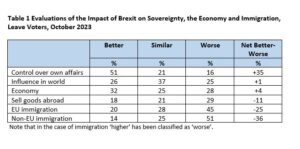
|
|
That represents a swing of 3% from re-join to stay out since our previous poll in August. Indeed, it is the first time this year that the percentage who say they would vote to re-join has been below 60%. This trend is consistent with the findings of other polls, which in recent weeks have typically been recording slightly lower levels of support for re-joining the EU.
This swing away from re-joining has been accompanied by a range of slight improvements since August in voters’ perceptions of the consequences of Brexit. For example, 21% now think that the economy is stronger than it would have been otherwise, compared with 19% in our previous poll. Similarly, 34% now feel that Brexit has given Britain more control over its own affairs, up from 32% in August. The proportion who think EU immigration has fallen as a result of Brexit has edged up from 18% to 20%, though, at the same time, the proportion who believe that ‘illegal’ immigration has increased now stands at 48%, its highest level since we first started asking the question in February.
But which, if any, of these evaluations matter for Leave voters’ current preferences for being inside or outside the EU? Are their minds still focused on the three issues – sovereignty, the economy, and immigration – that research suggests were central to the choice voters made in 2016? In particular, are these the issues that help us understand why some Leave voters now have a different attitude towards EU membership than the one they expressed seven years ago?
Table 1 shows how those who voted Leave in 2016 now evaluate the consequences of Brexit for the three key issues in the 2016 referendum. In each case respondents were asked whether, with the UK outside the EU, the position now is better/higher/more than it would have been otherwise, worse/lower/less, or similar to what would otherwise have happened.
 Leave voters have very different views across the three issues. They are inclined to believe Brexit has enabled Britain to have more control over its own affairs, a sentiment that might be thought central to sovereignty, although they are less certain that Britain has more influence outside its borders. On the economy, optimists and pessimists largely balance each other, albeit there is some uncertainty about the impact of Brexit on companies’ ability to sell goods abroad. However, whatever hopes they might once have had that immigration would fall appear to have disappeared. Around half think that immigration from both the EU and from outside has increased...
Leave voters have very different views across the three issues. They are inclined to believe Brexit has enabled Britain to have more control over its own affairs, a sentiment that might be thought central to sovereignty, although they are less certain that Britain has more influence outside its borders. On the economy, optimists and pessimists largely balance each other, albeit there is some uncertainty about the impact of Brexit on companies’ ability to sell goods abroad. However, whatever hopes they might once have had that immigration would fall appear to have disappeared. Around half think that immigration from both the EU and from outside has increased...
more at EU-UK